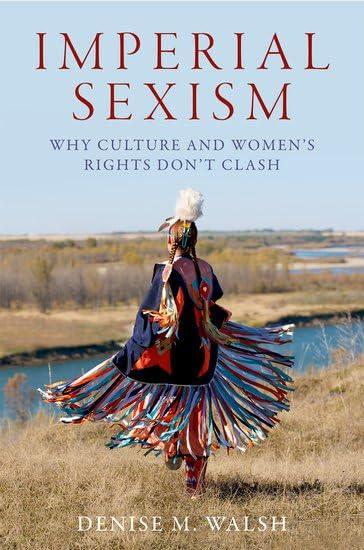Join IHGC; the Political Theory Colloquium; Comparative Politics; and the Department of Women, Gender and Sexuality Studies for a book talk and discussion of Professor Denise Walsh's (Politics) new book, Imperial Sexism: Why Culture and Women's Rights Don't Clash. Walsh will provide a brief overview of the book followed by a Q&A session moderated by Carolyn Ang Dang, PhD student in the Department of Politics.
Lunch will be provided and FREE COPIES are available to registrants while supplies last. Please REGISTER by Monday, February 23.
Image

Imperial Sexism: Why Culture and Women's Rights Don't Clash
Communities across the world engage in gender practices that are seen by many as in conflict with women's rights, such as Muslim women's face veils and polygyny. But in Imperial Sexism, Denise M. Walsh argues that culture and women's rights are not inherently at odds. The root problem is imperial sexism: the legacy of colonial-era racism and sexism and their compounding harms.
Through a cross-regional comparative analysis of three dissimilar policy debates in three very different democracies--the 2014 French "burka ban" adjudicated at the European Court of Human Rights, the 1998 legalization of polygyny in post-apartheid South Africa, and the 1985 reform of the "marrying out" rule for Indigenous women in Canada--Walsh confirms that a clash between culture and women's rights is always avoidable, examines why the presumption of a clash endures, and highlights the damage this presumption causes. She centers the voices of women who experience imperial sexism, many of whom resist the notion of a clash and instead harmonize cultural, religious, and women's rights by focusing on their plural identities and lived experiences. By contrast, when politicians and conservative group leaders insist upon a clash, they rely on imperial myths, binaries, and tropes, and a misuse of history. Ultimately, by amplifying the arguments of women most affected by controversial gender practices, Imperial Sexism develops a framework to promote justice, reject colonial prejudice, and strengthen the indivisibility of human rights and democratic inclusiveness.
Through a cross-regional comparative analysis of three dissimilar policy debates in three very different democracies--the 2014 French "burka ban" adjudicated at the European Court of Human Rights, the 1998 legalization of polygyny in post-apartheid South Africa, and the 1985 reform of the "marrying out" rule for Indigenous women in Canada--Walsh confirms that a clash between culture and women's rights is always avoidable, examines why the presumption of a clash endures, and highlights the damage this presumption causes. She centers the voices of women who experience imperial sexism, many of whom resist the notion of a clash and instead harmonize cultural, religious, and women's rights by focusing on their plural identities and lived experiences. By contrast, when politicians and conservative group leaders insist upon a clash, they rely on imperial myths, binaries, and tropes, and a misuse of history. Ultimately, by amplifying the arguments of women most affected by controversial gender practices, Imperial Sexism develops a framework to promote justice, reject colonial prejudice, and strengthen the indivisibility of human rights and democratic inclusiveness.